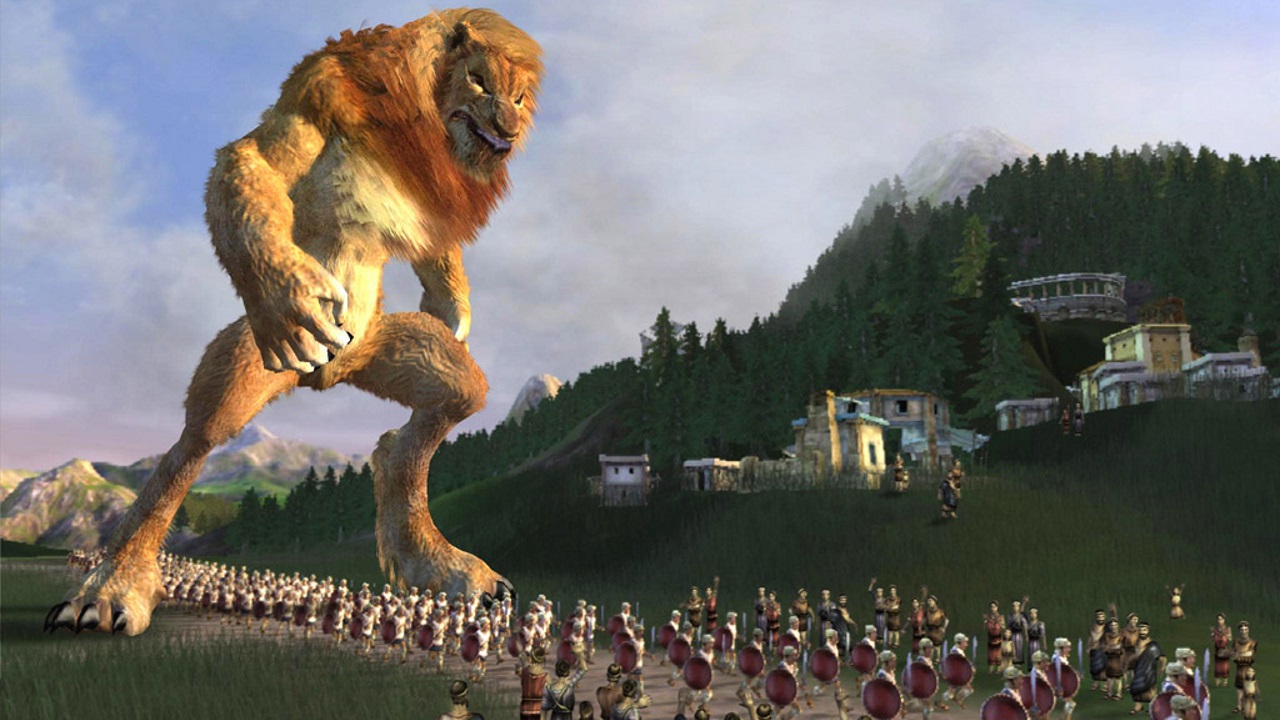
There's nothing in the world like a good god game.
Ever since 2001, I've held onto my original copy of Black & White, keeping it safe and secure in its weathered old CD sleeve. Developed by the now-defunct Lionhead Studios and spearheaded by Peter Molyneux, Black & White still charms me every time I fire it up and meet the two halves of my conscience all over again. Or maybe it charms me when this earworm starts up. Or when I have a mountain-sized unicorn squat and poop on an enemy's house.
Other than perhaps Molyneux's own Populous or Godus, Black & White is the perfect encapsulation of the 'god game' - a genre that seems to be all but extinct, with relatively few titles even attempting to emulate these bygone designs, and even fewer making significant waves. So where did all the god games go, and can they ever be brought back?
The definition of a god
Compared to genres like first-person shooter, the descriptor 'god game' feels nebulous and vague. General consensus is that god games challenge players to foster populations and help them grow; everything from simple organisms (Spore, Evolution: The Game of Intelligent Life) to small tribes (Black & White, From Dust) to entire civilizations (Black & White 2, Godus) can be the subject of a god game's focus. However, the most crucial criteria is that a god game lets a player exert influence indirectly as opposed to explicitly.
Unlike strategy games or city-building games, which gave players direct control over their units, buildings, and sometimes even cities or nations, god games rely on players making more subtle influences to artificial intelligence algorithms. If you move an orc into an empty field in Warcraft, it'll just stand there and wait for your next command. In a god game, NPCs must be largely able to function on their own, and should react to their environments in a contextually appropriate way. They need to have autonomy.
The most godlike action you'll get in Maxis' city management simulator is calling in a tornado or meteor apocalypse. Everything else is just cornflakes.
A god game will often feature (but not require) environmental manipulation, typically through means presented as otherworldly or supernatural. Dredging lakes, shaping mountains, causing massive thunderstorms, that sort of thing.
In other words, while the denizens of SimCity may be able to drive to work and pay taxes, any changes made to the landscape are often minimal or are simply expressed as if they were the act of bulldozers and construction equipment. The most godlike action you'll get in Maxis' city management simulator is calling in a tornado or meteor apocalypse. Everything else is just cornflakes.
Sign up to the GamesRadar+ Newsletter
Weekly digests, tales from the communities you love, and more
Artificial intelligence evolves
Where god games have fallen behind, ironically enough, is where they once outshined all others: implementation of artificial intelligence. If a single human in a god game were to be dropped off in an empty pasture, it should be able to find its way back home safely, or at least find food and shelter without input from the player. These individuals also need to function within a larger society, fulfilling the various roles needed to advance their civilization.
To go back to Black & White, a village can sustain itself even if I don't do anything to interact with them. They gather the required amount of food to eat and the required amount of lumber to build and expand, and will reproduce at a slow but steady rate. I can meddle by inspiring villagers to become farmers, fishermen, builders, breeders (yes, that's the actual word the game uses, and yes, it's a little gross), and so on. I can also just take care of their needs by harvesting food and dumping it into their grain silo, or dumping piles of wood into their reserves.
When I interact with the village, their artificial intelligence recognizes me and adapts accordingly. If I inspire the village to be littered with builders, I'll get a sprawling settlement in no time, but their food reserves may start to run low. If I just take care of the village's needs instead of inspiring its populace, they'll become lazy and start relying on me by default. And if I do nothing, I run the risk of losing my power and having my village taken over by another god.
Black & White also gave you a Creature; an anthropomorphic pet who could learn by observing your actions and being rewarded or punished. It could grow strong and vicious, or kind and benevolent. It could grow muscles the size of houses and attack enemies head-on, or learn magic to channel its divinity and awe the masses.
I personally taught my lion to dance for enemy villagers, wooing them and making them believe in me. At least until he got hungry, because I also taught him that humans were the best food to eat. I also trained him to poop almost exclusively on houses. And when he got bigger, those turds were positively destructive. "LOVE me! FEAR me! LOVE me! FEAR me!" *pbbbbt!* Back in the day, this was revolutionary. The creature's AI programming even earned Black & White a spot in the 2003 Guinness World Records for ‘most intelligent being in a game’.
But it's not 2003 anymore. By today's standards, gathering two major resources is child's play. Managing a village is routine to the point of being inane. Placing someone in a field to turn them into a farmer is, at best, a quaint trick. The genre has failed to evolve with the times. Though I maintain that making a giant lion poop on your enemy's house is still funny as hell.
Godly inspiration
It's not surprising that god games are stuck in the past. As games have grown more complex, we've demanded more from our virtual subordinates, and from our digital worlds. We have games now where every item of clothing your avatar wears has different resistances to heat, cold, wet, or dry conditions, varying density and weight, and durability. We have worlds populated by NPCs who have their own schedules to abide by, and unique quirks. Some games simulate entire ecosystems and populate them with a delicate balance of predator and prey.
When dealing with the simultaneously massive and vague scale of godhood, you have to ask yourself: where do you direct your focus? Do you give each denizen their own unique life, or do you focus on how they interact with the environment? Do you craft a finely tuned ecosystem, or increase the number of ways you can alter and influence the AI? Or do you try to expand on all of these systems (and more) and pray your budget can accommodate? Don't forget: all the while you're increasing graphical fidelity to account for our absurdly clear modern screens.
Reigning in the scope and accounting for all the variables in a god game makes it an impossible (or at least extremely difficult) task for most studios. A comeback could happen - a sudden spike in previously thought-to-be-dead genres has certainly happened before (see: Amnesia: The Dark Descent and the resurgence of survival horror).
But the last god game to advertise itself as such and be worth its salt is Reus (Steam), which is nearly five years old at this point. On mobile, you could check out Godus (iTunes, Google Play) or Topia (iTunes, Google Play), but the former is notoriously riddled with bugs (the PC version has been in Early Access for four years) and the latter is based solely on environment manipulation - no civilization management aspects. For now, it would seem that for all intents and purposes, the god game is dead.
Don't be sad though. Whether the god game is deceased or just in a state of hibernation, this doesn't mean that you can't see, experience, or appreciate the influence they've had on modern games. The genre might've wilted, but the DNA persists.
Environmental manipulation lives on in games like Minecraft and Terraria. Balanced and self-sustaining ecosystems are waiting for you in No Man's Sky, The Long Dark, and Rain World. Wreaking havoc in a physics-enabled sandbox is a hallmark of mayhem-paloozas like the Just Cause series or Grand Theft Auto. Player ingenuity and creative problem solving are front and center in modern classics like Legend of Zelda: Breath of the Wild. And you can influence complicated, personable AI in games like Kerbal Space Program or Middle-earth: Shadow of War.
Of course I'd love to see a Black & White 3 someday. But until then, I'm happy with the followers that the god game has inspired.
Sam is a former News Editor here at GamesRadar. His expert words have appeared on many of the web's well-known gaming sites, including Joystiq, Penny Arcade, Destructoid, and G4 Media, among others. Sam has a serious soft spot for MOBAs, MMOs, and emo music. Forever a farm boy, forever a '90s kid.




